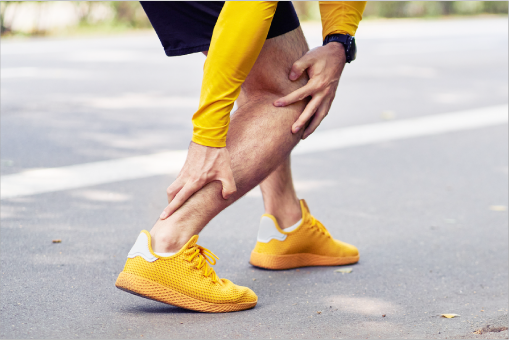
You don’t have to be a professional athlete to injure your Achilles tendon. “Weekend warrior” athletes who overdo it are at risk of this injury. It can even happen performing simple household tasks like climbing a ladder.
The Achilles tendon is the longest tendon in the body. It runs down the back of the lower leg and connects the calf muscle to the heel bone. This tendon is very strong but withstands considerable wear and tear during everyday activities like walking, running, jumping or standing on tiptoe.
Achilles tendon weakness is common in adults. As we age, our tendons grow tighter and become less pliable. By seeking treatment when symptoms such as heel pain occur, you can prevent more serious injury.
A common injury is Achilles tendonitis, when the tendon becomes inflamed from overuse or stress. It may be caused by suddenly increasing activity without warming up or wearing inappropriate or worn shoes. Workers whose routine puts constant stress on their feet and ankles are also more prone to this injury.
The main symptoms of Achilles tendonitis are pain, stiffness and tenderness at the back of the heel. Pain often occurs in the morning, improves with motion, but gets worse with increasing stress and activity.
Non-surgical treatments for Achilles tendonitis include rest, icing, night splints and heel lifts. Non-steroidal anti-inflammatory medication like ibuprofen and physical therapy may also prove effective.
Surgery is an option if other treatments don’t restore the tendon to normal function.
People risk further deterioration and possible rupture of the Achilles tendon when they don’t seek medical care for Achilles tendon injuries. A rupture occurs when the tendon is stretched beyond its capacity and either tears partially or completely.
Typically, an Achilles rupture happens while playing sports, especially those involving abrupt stops, starts and turns. In sports like basketball and tennis, muscles and tendons in the back of the leg are prone to injury from an imbalance that occurs due to a lot of forward motion. This frontal imbalance can weaken the tendon unless stretching exercises are performed regularly.
Suddenly bending the ankle backward, or tripping and landing on the foot in an awkward way, can also rupture the tendon. Less commonly, certain illnesses or medication may rupture the tendon.
When a rupture occurs, a popping or snapping sensation may be heard. It can feel like being kicked or shot in the back of the ankle. The pain may subside to a dull ache, but it is difficult to walk up stairs or rise on your toes.
Rest, casting or bracing, and physical therapy may heal the rupture. But surgery is often the most successful treatment.
The best way to prevent an Achilles tendon injury is to stretch and warm up gradually. Avoid strenuous sprinting or hill running if you are not in shape.
For more information about Achilles tendon injuries or to schedule an appointment, contact Wentz Foot & Ankle Specialists at
719-539-6600.
Dr. Ralph Wentz is a board-certified foot and ankle surgeon in Salida and a fellow of the American College of Foot and Ankle Surgeons.
